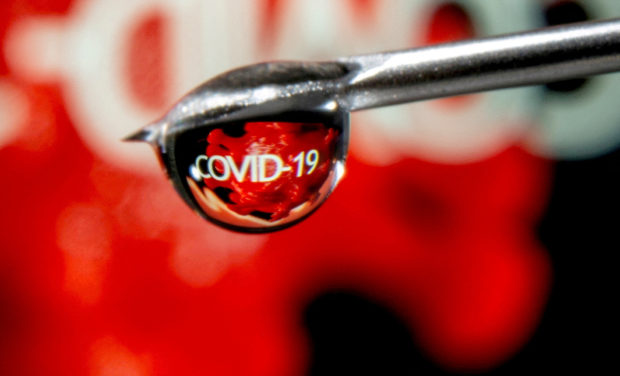U.S. COVID public health emergency to stay in place

The word “COVID-19” is reflected in a drop on a syringe needle in this illustration taken November 9, 2020. (REUTERS/Dado Ruvic/Illustration/File Photo)
WASHINGTON – The United States will keep in place the public health emergency status of the COVID-19 pandemic, allowing millions of Americans to still receive free tests, vaccines and treatments until at least April of next year, two Biden administration officials said on Friday.
The possibility of a winter surge in COVID cases and the need for more time to transition out of the public health emergency to a private market were two factors that contributed to the decision not to end the emergency status in January, one of the officials said.
The public health emergency was initially declared in January 2020, when the coronavirus pandemic began, and has been renewed each quarter since. But the government in August began signaling it planned to let it expire in January.
The U.S. Department of Health and Human Services has promised to give states 60 days’ notice before letting the emergency expire, which would have been on Friday if it did not plan on renewing it again in January. The agency did not provide such notice, the second official said.
Health experts believe a surge in COVID-19 infections in the United States is likely this winter, one official said.
“We may be in the middle of one in January,” he said. “That is not the moment you want to pull down the public health emergency.”
Daily cases are down to an average of over 41,284 as of Nov. 9 but an average of 335 people a day die from it, according to the latest U.S. Centers for Disease Control and Prevention (CDC) data.
Daily U.S. cases are projected to rise slowly to nearly 70,000 by February, driven by students returning to schools and cold weather-related indoor gatherings, the University of Washington’s Institute for Health Metrics and Evaluation (IHME) said in an Oct. 21 analysis. Deaths are forecast at about the same level.
The officials said a lot of work remained to be done for the transition out of the public health emergency. That work was ongoing.
The government has been paying for COVID vaccines, some tests, and certain treatments, as well as other care under the public health emergency declaration. When the emergency expires, the government will begin to transfer COVID healthcare to private insurance and government health plans.
Health officials held a large meeting with insurers and drugmakers about moving sales and distribution of COVID vaccines and treatments to the private sector in August, but only one other large meeting, which took place in October, has been publicly announced since.
gsg
For more news about the novel coronavirus click here.
What you need to know about Coronavirus.
For more information on COVID-19, call the DOH Hotline: (02) 86517800 local 1149/1150.
The Inquirer Foundation supports our healthcare frontliners and is still accepting cash donations to be deposited at Banco de Oro (BDO) current account #007960018860 or donate through PayMaya using this link.














